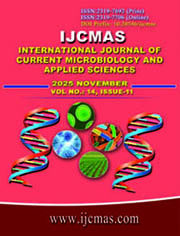


 National Academy of Agricultural Sciences (NAAS)
National Academy of Agricultural Sciences (NAAS)

|
PRINT ISSN : 2319-7692
Online ISSN : 2319-7706 Issues : 12 per year Publisher : Excellent Publishers Email : editorijcmas@gmail.com / submit@ijcmas.com Editor-in-chief: Dr.M.Prakash Index Copernicus ICV 2018: 95.39 NAAS RATING 2020: 5.38 |
The human microbiome, a diverse community of microorganisms inhabiting the body, plays a pivotal role in keeping health and regulating immunity. Once regarded as passive inhabitants, these microbes are now recognised as active participants in immune development, metabolic regulation, and disease prevention. The gut microbiome serves as a major immunological interface, influencing the maturation of immune cells, cytokine balance, and mucosal defence mechanisms. Alterations in microbial composition known as dysbiosis can disrupt this balance, leading to immune dysregulation and chronic inflammation. Increasing evidence links dysbiosis to a wide range of disorders, including inflammatory bowel disease, obesity, diabetes, autoimmune conditions, and neuropsychiatric disorders. The microbiome’s role extends beyond the gut, affecting systemic immunity and even modulating responses to infections, vaccines, and cancer therapies. Therapeutic strategies such as probiotics, prebiotics, dietary interventions, and fecal microbiota transplantation (FMT) are being explored to restore microbial homeostasis and enhance immune function. Despite remarkable advances, significant challenges remain in defining a “healthy” microbiome and standardising analytical methods. This review highlights current understanding of the human microbiome’s contribution to immune regulation and disease pathogenesis, emphasising the need for integrative, personalised approaches in microbiome-based medicine. Continued research in this field holds immense promise for transforming prevention and treatment strategies across multiple domains of human health.
 |
 |
 |
 |
 |